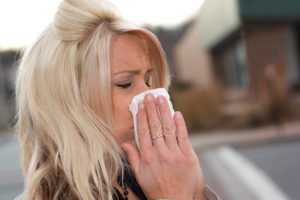
Recent studies have shown that adults who get less than seven hours of sleep a night are three times more likely to catch a cold than their peers who get at least eight hours of sleep a night. Photo credit: Bigstock
You can run, but you can’t hide. Cold and flu season is lurking just around the corner. Cue the coughing, sneezing, headaches and all around misery. You might not be able to avoid cold and flu season, but that doesn’t mean you can’t protect yourself from its attack. Simply getting adequate sleep can decrease your chance of falling ill.
According to the Mayo Clinic, “Studies show that people who don’t get quality sleep or enough sleep are more likely to get sick after being exposed to a virus, such as a common cold virus. Lack of sleep can also affect how fast you recover if you do get sick.”
How Sleep Helps Fight Off Colds
Sleep bolsters your immune system by promoting the production of cytokines, which are needed to ward off sicknesses. Recent studies have shown that adults who get less than seven hours of sleep a night are three times more likely to catch a cold than their peers who get at least eight hours of sleep a night. From that perspective, getting the right quantity and quality of sleep can actually save you time and money in the long run. Imagine being able to use your PTO for something fun instead of being sick!
How to Get Better Sleep
As 47 million Americans report not getting adequate sleep, it might be time to make some changes. Here are a few simple tips to help you get the cold fighting, immune system-boosting sleep you need.
- Keep a set routine. Try to go to bed and wake up at the same time each day. This will help your body clock know when it is time for rest and when it is time for action.
- Keep screens out of the bedroom. It not breaking news that televisions, tablets and telephones disrupt sleep. Keep electronics out of the bedroom to improve the quality of your sleep and decrease the time it takes to fall asleep.
- Keep caffeine and alcohol to a minimum. Consuming caffeine late in the day can disrupt your body’s rhythm and therefore your sleep cycles. Try to cut off caffeine several hours before you plan to go to bed. The same goes for alcohol. While its effects might leave you sleepy at first, ultimately alcohol disrupts sleep and makes for an even sleepier morning.
Developing new sleep habits might feel like a sacrifice at first, but eventually you will be able to look back and see how getting good sleep saves you from so many of life’s frustrations, including the common cold. If you think you suffer from a sleep disorder or would like more information about getting better sleep, visit www.valleysleepcenter.com today and give us a call to schedule a consultation.

